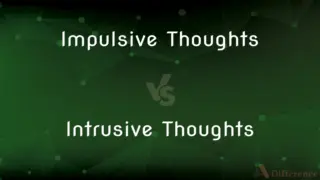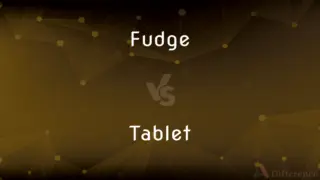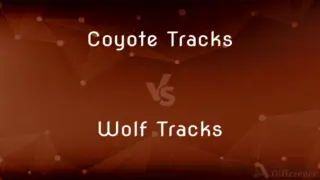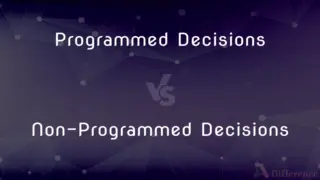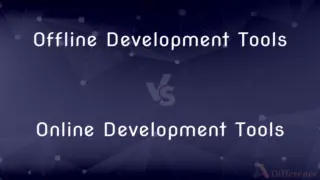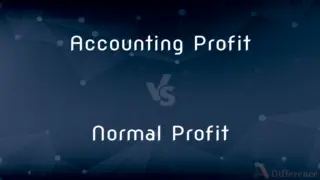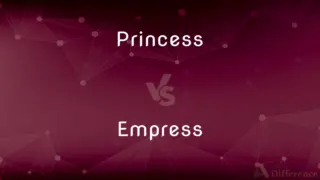Object vs. Complement — What's the Difference?
By Tayyaba Rehman & Fiza Rafique — Updated on October 3, 2023
An object receives the action of a verb, while a complement provides more information about the subject or object by describing or completing its meaning.

Difference Between Object and Complement
Table of Contents
ADVERTISEMENT
Key Differences
In the English language, an object is directly influenced by the verb's action, and it often refers to the receiver of the action. On the flip side, a complement is a word or word group that completes the predicate in a sentence. Both elements, object and complement, help to convey precise meanings by providing additional details about actions or states.
Considering the object in grammatical terms, it is usually a noun, pronoun, or noun phrase that comes after the verb. The complement, conversely, may come after a linking verb and not necessarily describe an action but rather describe or complete the subject. Both components are pivotal in enhancing the clarity of a sentence, yet they serve different grammatical roles.
Interestingly, an object is often something that sustains the action or is affected by the action of the verb. Contrastingly, a complement is specifically focused on providing additional details about either the subject or the object, without being affected by the verb's action. Both terms, object and complement, might be confused due to their post-verb position, but their functionalities differ remarkably.
Diving deeper into objects, they can be classified into direct and indirect objects, offering layers to sentence structure and meaning. Complements, in another realm, can be subject or object complements, amplifying information about the subject or object respectively. Both, object and complement, though diverse in function, enrich sentence structure and depth.
In sentences, an object usually answers "whom" or "what" in relation to the verb. Whereas, a complement often provides answers about the subject, giving more insights into "what" the subject is in a more attributive or identificative manner. Although object and complement may seem to have similar placements, they answer different questions within sentence constructs.
ADVERTISEMENT
Comparison Chart
Definition
Receives the verb's action
Completes or describes the subject/object
Types
Direct and indirect objects
Subject and object complements
Answers the question
"Whom" or "What"
Additional information about subject/object
Relation with Verb
Affected by the action
Not directly affected by the action
Example Usage
He saw the dog.
She is a teacher.
Compare with Definitions
Object
A material thing that can be seen and touched.
She bought a new object for the kitchen.
Complement
Something that completes or goes well with something.
Strawberries and cream are a perfect complement.
Object
A material thing that can be seen and touched
Small objects such as shells
He was dragging a large object
Complement
The usual number or quantity of items or people that something can hold or accommodate.
The boat has a complement of 20 passengers.
Object
A person or thing to which a specified action or feeling is directed
Disease became the object of investigation
He hated being the object of public attention
Complement
In grammar, a word or word group that completes the predicate.
She is the chief officer.
Object
A noun or noun phrase governed by an active transitive verb or by a preposition
In Gaelic the word order is verb, subject, object
Complement
An amount or number needed to make something complete.
We have a full complement of staff.
Object
A data construct that provides a description of anything known to a computer (such as a processor or a piece of code) and defines its method of operation
The interface treats most items, including cells, graphs, and buttons, as objects
Complement
In mathematics, the set of all the elements of a universal set not included in a particular subset.
The complement of the set can be represented by a Venn diagram.
Object
Say something to express one's opposition to or disagreement with something
‘It doesn't seem natural,’ she objected
The boy's father objected that the police had arrested him unlawfully
Residents object to the volume of traffic
Complement
Something that completes, makes up a whole, or brings to perfection
A sauce that is a fine complement to fish.
Object
A specific, individual, material entity, especially one that is not living or not sentient.
Complement
The quantity or number needed to make up a whole
Shelves with a full complement of books.
Object
A focus of attention, feeling, thought, or action
A product that was so bad it became an object of derision.
Complement
The full crew of personnel required to run a ship.
Object
A limiting factor that must be considered
Since money is no object, let's eat at that fancy place.
Complement
Either of two parts that complete the whole or mutually complete each other.
Object
The purpose, aim, or goal of a specific action or effort
The object of the game.
Complement
An angle related to another so that the sum of their measures is 90°.
Object
A noun, pronoun, or noun phrase that receives or is affected by the action of a verb within a sentence.
Complement
(Grammar) A word or words used to complete a predicate construction, especially the object or indirect object of a verb, for example, the phrase to eat ice cream in We like to eat ice cream.
Object
A noun or substantive governed by a preposition and typically following it.
Complement
(Music) An interval that completes an octave when added to a given interval.
Object
(Philosophy) Something intelligible to or perceptible by the mind.
Complement
(Immunology) A complex system of proteins found in blood plasma that are sequentially activated and play various roles in the immune response, including lysing bacterial cell membranes, making pathogens more susceptible to phagocytes, and recruiting inflammatory cells to sites of infection or injury. Also called alexin.
Object
A discrete item than can be selected and maneuvered, such as an onscreen graphic.
Complement
Mathematics & Logic For a universal set, the set of all elements in the set that are not in a specified subset.
Object
In object-oriented programming, a structure that combines data and the procedures necessary to operate on that data.
Complement
A complementary color.
Object
To present a dissenting or opposing argument; raise an objection
Objected to the testimony of the witness.
Complement
To serve as a complement to
Roses in a silver bowl complement the handsome cherry table.
Object
To be averse to or express disapproval of something
Objects to modern materialism.
Complement
Something (or someone) that completes; the consummation.
Object
To put forward in or as a reason for opposition; offer as criticism
They objected that discipline was lacking.
Complement
(obsolete) The act of completing something, or the fact of being complete; completion, completeness, fulfilment.
Object
A thing that has physical existence but is not alive.
Complement
The totality, the full amount or number which completes something.
Object
; goal, end or purpose of something.
Complement
(obsolete) Something which completes one's equipment, dress etc.; an accessory.
Object
(grammar) The noun phrase which is an internal complement of a verb phrase or a prepositional phrase. In a verb phrase with a transitive action verb, it is typically the receiver of the action.
Complement
(nautical) The whole working force of a vessel.
Object
A person or thing toward which an emotion is directed.
Mary Jane had been the object of Peter's affection for years.
The convertible, once the object of his desire, was now the object of his hatred.
Where's your object of ridicule now?
Complement
(heraldry) Fullness (of the moon).
Object
(object-oriented programming) An instantiation of a class or structure.
Complement
An angle which, together with a given angle, makes a right angle.
Object
(category theory) An instance of one of the two kinds of entities that form a category, the other kind being the arrows (also called morphisms).
Similarly, there is a category whose objects are groups and whose arrows are the homomorphisms from one group to another.
Complement
Something which completes, something which combines with something else to make up a complete whole; loosely, something perceived to be a harmonious or desirable partner or addition.
Object
(obsolete) Sight; show; appearance; aspect.
Complement
A word or group of words that completes a grammatical construction in the predicate and that describes or is identified with the subject or object.
Object
(intransitive) To disagree with or oppose something or someone; (especially in a Court of Law) to raise an objection.
I object to the proposal to build a new airport terminal.
We strongly object to sending her to jail for ten years.
Complement
(music) An interval which, together with the given interval, makes an octave.
Object
To offer in opposition as a criminal charge or by way of accusation or reproach; to adduce as an objection or adverse reason.
Complement
(optics) The color which, when mixed with the given color, gives black (for mixing pigments) or white (for mixing light).
The complement of blue is orange.
Object
To set before or against; to bring into opposition; to oppose.
Complement
(set theory) Given two sets, the set containing one set's elements that are not members of the other set (whether a relative complement or an absolute complement).
The complement of the odd numbers is the even numbers, relative to the natural numbers.
Object
To set before or against; to bring into opposition; to oppose.
Of less account some knight thereto object,Whose loss so great and harmful can not prove.
Some strong impediment or other objecting itself.
Pallas to their eyesThe mist objected, and condensed the skies.
Complement
(immunology) One of several blood proteins that work with antibodies during an immune response.
Object
To offer in opposition as a criminal charge or by way of accusation or reproach; to adduce as an objection or adverse reason.
He gave to him to object his heinous crime.
Others object the poverty of the nation.
The book . . . giveth liberty to object any crime against such as are to be ordered.
Complement
(logic) An expression related to some other expression such that it is true under the same conditions that make other false, and vice versa.
Object
To make opposition in words or argument; to express one's displeasure; - usually followed by to; as, she objected to his vulgar language.
Complement
(electronics) A voltage level with the opposite logical sense to the given one.
Object
That which is put, or which may be regarded as put, in the way of some of the senses; something visible or tangible and persists for an appreciable time; as, he observed an object in the distance; all the objects in sight; he touched a strange object in the dark.
Complement
(computing) A bit with the opposite value to the given one; the logical complement of a number.
Object
Anything which is set, or which may be regarded as set, before the mind so as to be apprehended or known; that of which the mind by any of its activities takes cognizance, whether a thing external in space or a conception formed by the mind itself; as, an object of knowledge, wonder, fear, thought, study, etc.
Object is a term for that about which the knowing subject is conversant; what the schoolmen have styled the "materia circa quam."
The object of their bitterest hatred.
Complement
The diminished radix complement of a number; the nines' complement of a decimal number; the ones' complement of a binary number.
The complement of is .
Object
That toward which the mind, or any of its activities, is directed; that on which the purpose are fixed as the end of action or effort; that which is sought for; goal; end; aim; motive; final cause.
Object, beside its proper signification, came to be abusively applied to denote motive, end, final cause . . . . This innovation was probably borrowed from the French.
Let our object be, our country, our whole country, and nothing but our country.
Complement
The radix complement of a number; the two's complement of a binary number.
The complement of is .
Object
Sight; show; appearance; aspect.
He, advancing closeUp to the lake, past all the rest, aroseIn glorious object.
Complement
The numeric complement of a number.
The complement of −123 is 123.
Object
A word, phrase, or clause toward which an action is directed, or is considered to be directed; as, the object of a transitive verb.
Complement
(genetics) A nucleotide sequence in which each base is replaced by the complementary base of the given sequence: adenine (A) by thymine (T) or uracil (U), cytosine (C) by guanine (G), and vice versa.
A DNA molecule is formed from two strands, each of which is the complement of the other.
Object
Any set of data that is or can be manipulated or referenced by a computer program as a single entity; - the term may be used broadly, to include files, images (such as icons on the screen), or small data structures.
Complement
Obsolete spelling or misspelling of compliment. should this be at a different ety?
Object
Anything which exists and which has attributes; distinguished from attributes, processes, and relations.
Complement
(biochemistry) alexin
Object
Opposed; presented in opposition; also, exposed.
Complement
(economics) complementary good
Object
A tangible and visible entity; an entity that can cast a shadow;
It was full of rackets, balls and other objects
Complement
To complete, to bring to perfection, to make whole.
We believe your addition will complement the team.
Object
The goal intended to be attained (and which is believed to be attainable);
The sole object of her trip was to see her children
Complement
To provide what the partner lacks and lack what the partner provides, thus forming part of a whole.
The flavors of the pepper and garlic complement each other, giving a very rich taste in combination.
I believe our talents really complement each other.
Object
(grammar) a constituent that is acted upon;
The object of the verb
Complement
To change a voltage, number, color, etc. to its complement.
Object
The focus of cognitions or feelings;
Objects of thought
The object of my affection
Complement
(obsolete) Old form of compliment
Object
Express or raise an objection or protest or criticism or express dissent;
She never objected to the amount of work her boss charged her with
When asked to drive the truck, she objected that she did not have a driver's license
Complement
That which fills up or completes; the quantity or number required to fill a thing or make it complete.
Object
Be averse to or express disapproval of;
My wife objects to modern furniture
Complement
That which is required to supply a deficiency, or to complete a symmetrical whole.
History is the complement of poetry.
Object
The goal or purpose of a person's efforts.
The object of the game is to score points.
Complement
Full quantity, number, or amount; a complete set; completeness.
To exceed his complement and number appointed him which was one hundred and twenty persons.
Object
In grammar, a word affected by the verb's action.
She met him.
Complement
A second quantity added to a given quantity to make it equal to a third given quantity.
Object
Express or feel disapproval, opposition, or dissention.
He will object to the change.
Complement
Something added for ornamentation; an accessory.
Without vain art or curious complements.
Object
To offer a reason or argument in opposition.
She objected that the statement was misleading.
Complement
The whole working force of a vessel.
Complement
The interval wanting to complete the octave; - the fourth is the complement of the fifth, the sixth of the third.
Complement
A compliment.
Complement
To supply a lack; to supplement.
Complement
To compliment.
Complement
A word or phrase used to complete a grammatical construction
Complement
A complete number or quantity;
A full complement
Complement
Number needed to make up whole force;
A full complement of workers
Complement
Something added to complete or make perfect;
A fine wine is a perfect complement to the dinner
Complement
One of a series of enzymes in the blood serum that are part of the immune response
Complement
Either of two parts that mutually complete each other
Complement
Make complete or perfect; supply what is wanting or form the complement to;
I need some pepper to complement the sweet touch in the soup
Common Curiosities
Do both objects and complements always follow verbs?
Generally, yes – both objects and complements typically follow verbs.
Can a sentence have both an object and a complement?
Yes, a sentence can include both an object and a complement.
How can I identify an object in a sentence?
An object typically answers "what" or "whom" with respect to the verb.
What does a subject complement do?
A subject complement provides additional information about the subject.
Can a sentence exist without an object?
Yes, not all sentences require an object to be grammatically correct.
Can a complement be an adjective?
Yes, adjectives can serve as complements to describe subjects or objects.
How do complements and adverbs differ?
Complements describe/complete subjects/objects; adverbs modify verbs/adjectives.
What primarily distinguishes an object from a complement?
An object receives the verb’s action, while a complement describes or completes the subject/object.
What is the role of a complement in relation to a subject?
A complement often describes or provides more details about a subject.
Does the indirect object always come before the direct object?
Typically, yes – the indirect object usually precedes the direct object.
Are complements always required in sentences?
No, complements are not always required but add descriptive depth.
Can an object also act as a complement?
No, an object and a complement serve different grammatical purposes.
Are objects only nouns or can be pronouns too?
Objects can be nouns, pronouns, or noun phrases.
What type of verbs are typically followed by a complement?
Linking verbs, like “is” or “seems,” are often followed by a complement.
Can prepositional phrases act as objects?
Yes, prepositional phrases can function as objects in a sentence.
Share Your Discovery

Previous Comparison
Uniformitarianism vs. Catastrophism
Next Comparison
Utility vs. FacilityAuthor Spotlight
Written by
Tayyaba RehmanTayyaba Rehman is a distinguished writer, currently serving as a primary contributor to askdifference.com. As a researcher in semantics and etymology, Tayyaba's passion for the complexity of languages and their distinctions has found a perfect home on the platform. Tayyaba delves into the intricacies of language, distinguishing between commonly confused words and phrases, thereby providing clarity for readers worldwide.
Co-written by
Fiza RafiqueFiza Rafique is a skilled content writer at AskDifference.com, where she meticulously refines and enhances written pieces. Drawing from her vast editorial expertise, Fiza ensures clarity, accuracy, and precision in every article. Passionate about language, she continually seeks to elevate the quality of content for readers worldwide.















